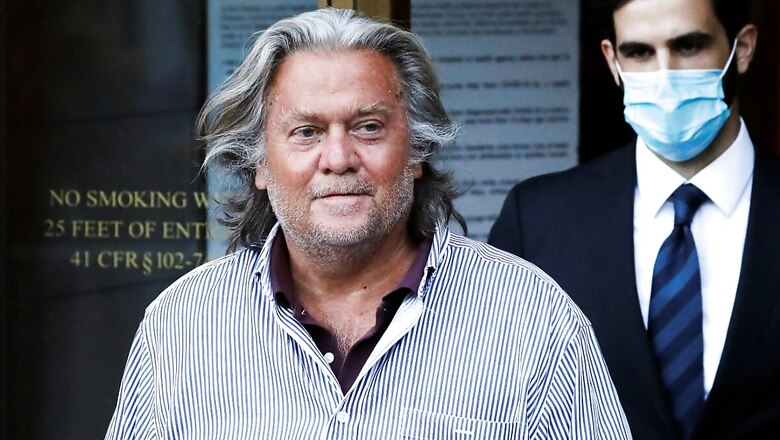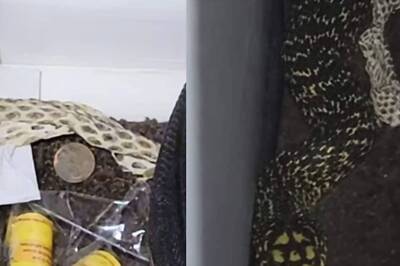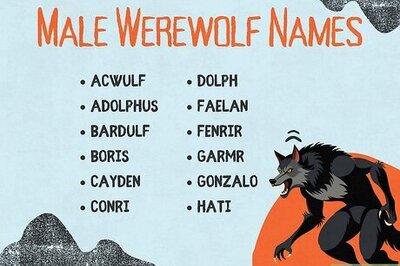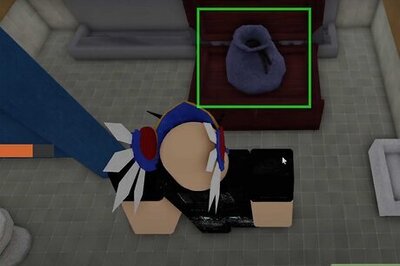
views
They all had colorful histories, though not necessarily the kind to inspire instant confidence. And they had a shared devotion to President Donald Trump.
Brian Kolfage, a decorated Iraq War veteran and motivational speaker, had created a string of pro-Trump websites using bogus stories to draw clicks and sell ads. Timothy Shea sold a Trump-themed energy drink he marketed as containing “liberal tears.” Andrew Badolato had a trail of failed businesses, unpaid tax bills and sexual misconduct allegations.
They came together early last year with a cherished project — building Trump’s long-promised, long-stalled border wall — and influential supporters to promote it, including Stephen Bannon, an architect of Trump’s 2016 victory and a former White House strategist. Together, the four men pitched We Build the Wall as a way for Americans worried about border security to do an end run around Congress and construct at least 100 miles of barriers with private money.
But according to a federal indictment unsealed Thursday, the men swindled donors, treating the more than $25 million they raised as a private piggy bank. Bannon, through an unnamed nonprofit organisation, received more than $1 million from the group, according to the court documents. Kolfage got a total of $350,000 that he spent on “home renovations, payments toward a boat, a luxury SUV, a golf cart, jewelry, cosmetic surgery, personal tax payments and credit card debt,” the indictment claimed. The others collected hundreds of thousands of dollars for personal expenses, prosecutors said. Bannon pleaded not guilty in the case.
Kolfage, the public face of the effort, had repeatedly assured donors that 100% of the money would go toward construction. “It’s hypocritical and ironic,” said Javier Perea, mayor of Sunland Park, New Mexico, where work on the private wall began. “These were individuals that were selling the idea of enforcing U.S. laws and enforcing our rules but were the ones who misled the American public on their intentions, if the allegations are true.”
Today, just under 5 miles of the private wall have been built, according to the company’s website. After experts recently said that the group’s decision to build along the banks of the Rio Grande in South Texas could cause the barriers to fall into the river, even Trump criticised the project.
But the effort earlier drew praise from Homeland Security and Border Patrol officials, as well as the president’s son Donald Trump Jr. A cast of Trump supporters worked on the board of We Build the Wall, including Kris Kobach, the former secretary of state for Kansas; Erik Prince, the defense contractor; Tom Tancredo, a former Colorado congressman; as well as the frequent Trump defenders David Alexander Clarke Jr., a former Wisconsin sheriff, and former Red Sox pitcher Curt Schilling.
The project was going forward as recently as Wednesday, when Kolfage appeared on Bannon’s podcast, “War Room,” to tout a fundraising effort for another cause — however vague — close to the president’s rhetoric: a fund “for the victims of Black Lives Matter.”
The We Build the Wall operators had tied themselves and their fortunes to the Trump era and the president’s brand, scorning Democrats and the federal bureaucracy. Kolfage, who had lost both legs and one arm in Iraq while serving in the Air Force, has posted multiple videos on Twitter mocking former President Barack Obama’s border control efforts and praising Trump’s.
Bannon, 66, and Badolato, 56, a financier from Sarasota, Florida, had been business partners since at least 2003, when they joined to create a number of new ventures, including a nasal spray company called SinoFresh Healthcare.
But like many business startups that Badolato was involved in, this one became mired in controversy, as a dispute broke out among executives over accusations of illegal trading of company stock and of using corporate funds for personal gain.
Shea, 49, of Castle Rock, Colorado, and his wife, Amanda, had built a growing national profile for themselves using social media to promote their business ventures. One of those was a company called Winning Energy, which frequently used images of Trump to drive sales on products such as a can of what it described as 12 ounces of “liberal tears.”
Kolfage, 38, from Miramar Beach, Florida, spent years operating Facebook pages and websites that sometimes trafficked in false or exaggerated news stories, many of them pro-Trump.
Kolfage became business partners with Amanda Shea after she built her own social-media-based marketing company that Kolfage used to increase traffic and profit at one of his websites, Right Wing News. When Facebook shut down that group in 2018 — shortly before the congressional elections — Kolfage and the Sheas started a new fundraising group they called Fight4FreeSpeech, which attracted support from nationally known conservatives including Donald Trump Jr. and often featured video clips of Bannon.
Kolfage suggested that the Trump campaign and presidency were a critical factor in his business success. “Connecting on Facebook made people fell like they were part of something,” he said. “Having a president who’s not part of the same old political spectrum really united people.”
His social media endeavors led to the birth in December 2018 of We Build the Wall, even as Trump struggled to secure money from Congress.
Kolfage repeatedly promised that none of the money would be used to pay executives involved in the fundraising efforts. But after it became clear that there was no mechanism to transfer the money to the government, Kolfage said the group would become a private foundation and build its own wall. It had determined that only $800,000 of the approximately $20 million raised at that point had to be returned to donors.
“No rules were broken,” Kolfage said in an interview last year. “Ninety-four percent of the donors we have been able to reach are opting in.”
Bannon began to play an increasing role in the organisation, the indictment said, “including its finances, messaging, donor outreach and general operations.” For example, he held promotional events near El Paso, Texas, to highlight progress on construction and continue raising funds.
The group hired a North Dakota company, Fisher Sand & Gravel, to build the barriers and publicly celebrated its work. The Trump administration then granted the North Dakota company a $400 million contract for the government-built wall, a deal that is currently being investigated by the inspector general for the Defense Department.
While Trump distanced himself from the project Thursday, Kobach, the former Kansas secretary of state, told The Times last year that the group had received the president’s blessing.
Donors, however, wondered what had happened to the money.
The Florida Department of Agriculture and Consumer Services, which oversees nonprofit groups in the state, announced last year that it had opened an investigation of We Build the Wall after complaints from three consumers.
One of the complaints, from Minnesota Assistant Attorney General Wendy Tien, who said she was writing in her personal capacity, raised concerns that We Build the Wall had misled donors in its efforts to raise funds. She questioned whether the group had obtained nonprofit status.
Another complaint came from Harvey Garlotte, a Hattiesburg, Mississippi, man who had donated $60. Garlotte said he “felt duped” because Kolfage — who had originally said he would donate the money to the border wall — was redirecting it to a nonprofit organisation he controlled.
“From my side of the road, Mr. Kolfage was simply using a hot-button topic, a very emotional topic, and his status as a wounded veteran, for selfish and self-serving reasons and personal financial gain,” Garlotte wrote to The Times.
Kolfage at the time mocked such concerns. “This is hilarious,” he wrote, retweeting official copies of the complaints.
In a statement Thursday, the Florida Department of Agriculture and Consumer Services said that after opening an investigation in May 2019, it had referred the case to the FBI. It was not clear whether the referral had led to the arrests Thursday.
Zolan Kanno-Youngs, Eric Lipton, Stephanie Saul and Scott Shane c.2020 The New York Times Company



















Comments
0 comment